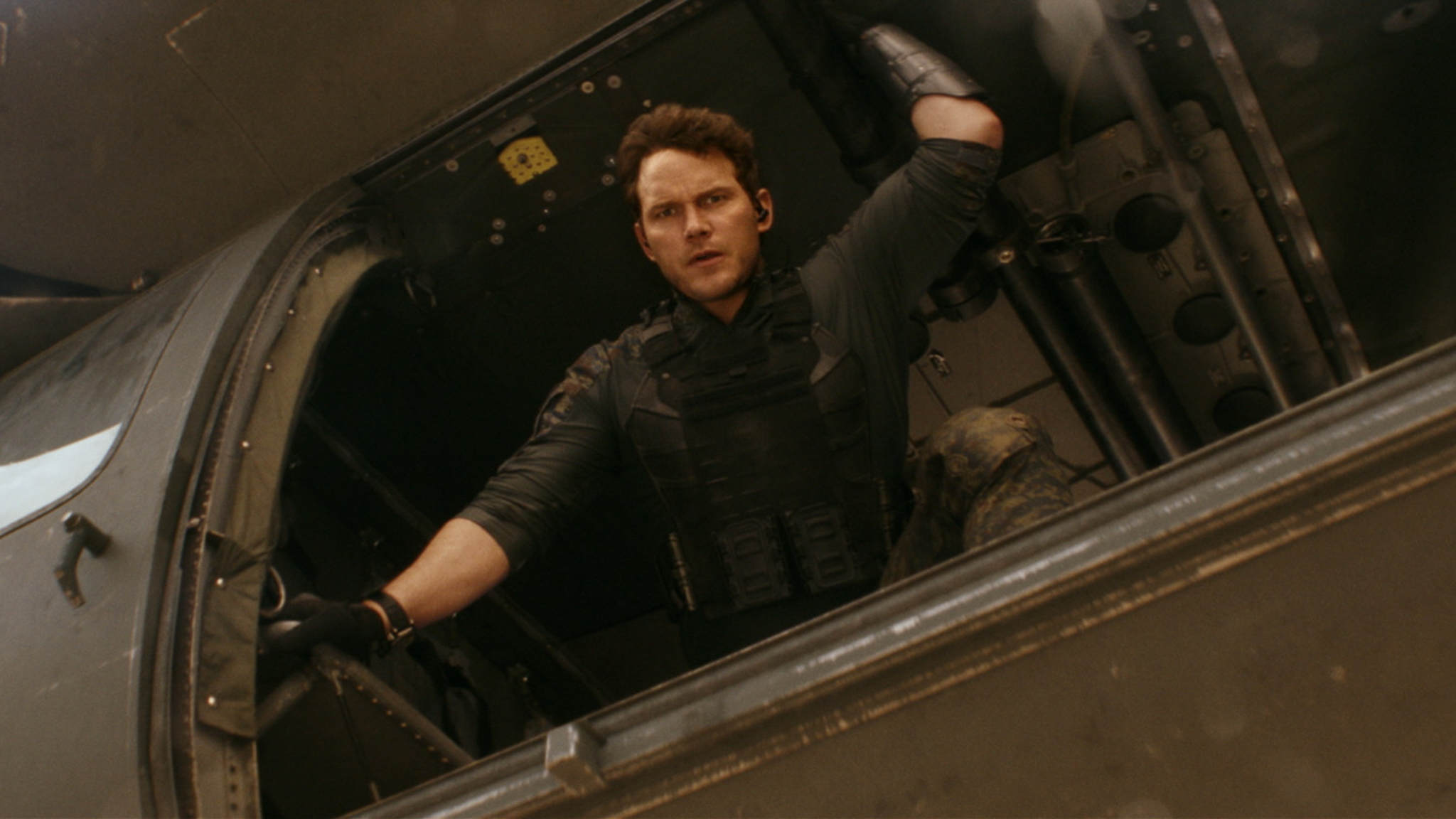What to Watch Verdict
Director Chris McKay yields all of the personality he displayed on 'The Lego Batman Movie' to deliver this noisy, bland, overlong action thriller.
Pros
- +
🪖 Yvonne Strahovksi adds complexity to her scenes as Pratt's adult daughter, reckoning with their family history as the fate of humanity reaches its climax.
- +
🪖 Some terrific location shooting or production design creates compelling visuals in the film's final scenes.
Cons
- -
🪖 Zach Dean's script gives the characters exactly — and only — as much detail as is needed for this jigsaw puzzle of cliches to fit together.
- -
🪖 If there's a sci-fi invasion film, this one either imitates or rips it off in some way.
This post contains mild spoilers for The Tomorrow War.
There’s nothing that Hollywood won’t exploit if it thinks audiences will pay for it, and the idea of “family” is just the latest in a long line of ideas, themes and topics serving as grist for the blockbuster mill. It’s every bit as much of a macguffin in the The Fast and the Furious franchise as any of the god devices or network security keys that the Toretto gang has to find, a word that’s become a universal motivator for set pieces whether or not the actual character development or storytelling supports it. It’s also the desperate superglue trying to hold together The Tomorrow War, a science fiction thriller in search of greater depth despite being cobbled together from elements of more alien invasion movies than audiences can count. Making his live-action debut, director Chris McKay loses all of the idiosyncratic creativity he showcased in The Lego Batman Movie to meet the needs of this lumbering star vehicle for Chris Pratt, who has skillfully transitioned into a bland silhouette of an action star while his collaborators on screen and behind the scenes scramble to inject the characters and story around him with a semblance of personality.
Pratt plays Dan Forester, a veteran with more than enough passion for science to teach suburban teenagers but not enough private-sector experience to earn the high-priced consulting job that he really wants. But when a wormhole dumps a phalanx of soldiers onto a soccer field where the World Cup is being played, Dan (along with the rest of the world) learns of a war taking place in the future where extinction of the human race is imminent — and more foot soldiers are needed to stop that from happening. World superpowers pool their efforts and institute a draft forcing individuals to jump decades ahead to battle an unknown alien adversary, but when Dan gets the call, he is understandably reluctant to leave behind his wife Emmy (Betty Gilpin) and especially his daughter Muri (Ryan Kiera Armstrong).
Conscripted to serve alongside a jocular science professor named Charlie (Sam Richardson) and a soldier named Dorian (Edwin Hodge) returning for his third tour, Dan quickly assumes a leadership role to complete their mission and guide his team to safety. But he soon discovers that his commanding officer is none other than his daughter Muri (Yvonne Strahovski), who’s now grown up and working on the front lines to defeat the extraterrestrial menace. As the window closes for them to save humanity before it is wiped completely from the face of the earth, Dan and Muri race to develop a biological weapon they can use to kill these beasts that have overrun the planet. But as they desperately grow closer to their goal, Dan decides to mount a last-ditch effort to uncover the origin of the invasion back in the past, stop the creatures from reproducing and spreading across the globe, and prevent the future war from ever having begun.
It’s hard to know if arriving at the tail end of a worldwide pandemic was the best or worst thing that could have possibly happened to this film, because we have now seen how well international superpowers (much less individual world leaders) cooperate to fight a threat that is, for all intents and purposes, invisible and must rely upon experts to navigate. But it also feels insane to believe in any reality that humanity would band together cohesively enough to agree to the idea of a worldwide military draft, conscripting people of all ages and backgrounds regardless of their fitness to serve, and somehow be convinced this was the solution to a problem decades in the future. Getting everyone on an individual block to wear masks to reduce risk during the height of Covid, where infection and death was occurring around them on a daily basis, continues to become a vicious point of contention. Nevertheless, the process by which even Dan — a dedicated patriot — is wrangled to fight proves shockingly soulless and punitive even at the height of the film’s “war effort.” Then again, he’s also chosen for a very specific reason, but the film’s sense of idealism and obligation are both so one dimensional, along with every other feeling audiences are to experience, that examining its deeper sociopolitical themes feels like a fool’s errand.
No, the bigger problem is that this story is either not sophisticated enough or does not care to hide the barbed-wire, Frankensteinian scars stitching together its influences. Each character is only as complex or detailed as the plot demands: Muri hangs the moon to Dan, who teaches her important lessons about scientific breakthroughs like Jonas Salk’s polio vaccine when he’s not scolding his nerdy student Martin (Seth Schenall) for being obsessed with volcanoes; Dan’s estranged father James (J. K. Simmons) works off the grid maintaining a retired military plane for a wealthy eccentric; despite being outfitted for combat, Charlie’s expertise is in Atmospheric Sciences; and so on. It doesn’t spoil anything to reveal that all of these details become relevant in the plot, but the movie spoils their obviousness by treating them almost coldly like exposition, or thinking that making a joke about them adds some nuance. Except for when Dan and Muri (as an adult) develop the antibody serum to kill aliens during a montage and some light father-daughter bonding, these characters are always easily equipped with everything they need to survive, from a transcontinental conveyance on a moment’s notice to an expert in subterranean electromagnetic waves. The same proves true with regard to conflicts and their resolution, be it a father Dan insists will never meet his grandfather, or a plucky scientist who learns to become a warrior exactly when it’s needed.
The action scenes all feel lifted from other films, from Aliens to Starship Troopers to The Empire Strikes Back, and it doesn’t help that they’re all scored at maximum volume by composer Lorne Balfe, who’s working overtime to guarantee that Hans Zimmer receives royalties for The Dark Knight. The vulnerability of the monsters functions like a first-person shooter game — they can only be injured in the throat or the abdomen — but for an army fighting against a zero-sum game for survival, everyone seems content to use semiautomatic weapons instead of bombs or other more destructive hardware, an odd choice since outside of the military personnel in the future, there are literally no survivors anywhere. Worse, the firefights and escapes are almost all overlong, repetitive and entirely predictable, concluding with some combination of a last-ditch effort, heroic sacrifice, and/or narrow escape that occurs just beyond a blast radius or edge of a precipice. Everything is amped to eleven in every scene, generating suspense that only comes with whether or not the viewer can peel their eyelids back far enough to see all of the action on screen.
The latest updates, reviews and unmissable series to watch and more!
Respectfully, Pratt still lacks the palpable onscreen intelligence that a Harrison Ford could give a character like this real depth (and feels tailor made for a more Ford-like actor), but he nevertheless juggles the script’s implausibilities with the exact kind of studied obliviousness that they require. Except for Strahovski, who laces their reunion with desperation and reluctant joy, everyone else feels largely on autopilot, though some spectacular production design in the film’s final scenes elevates interest long after the plot as run out of gas. But ultimately, this is a film that feels emblematic of the streaming era — not a real movie but one that’s too big just to premiere online, all loud noises and anemic star wattage and no real ideas except for the one somebody probably literally greenlit while riding up in an elevator to an executive’s second-floor office.
If there’s any indication that nature is healing, it’s that a movie like this one is opening in mid-summer, between the tentpoles that people really want to see; in fact, Pratt’s movie feels like a macguffin itself, just to get people to go to the movies. But the problem is that when they’re as formulaic and forgettable as The Tomorrow War, it serves too vividly as a reminder why they stopped going so frequently — even back when they could do so anytime they wanted.
Todd Gilchrist is a Los Angeles-based film critic and entertainment journalist with more than 20 years’ experience for dozens of print and online outlets, including Variety, The Hollywood Reporter, Entertainment Weekly and Fangoria. An obsessive soundtrack collector, sneaker aficionado and member of the Los Angeles Film Critics Association, Todd currently lives in Silverlake, California with his amazing wife Julie, two cats Beatrix and Biscuit, and several thousand books, vinyl records and Blu-rays.


